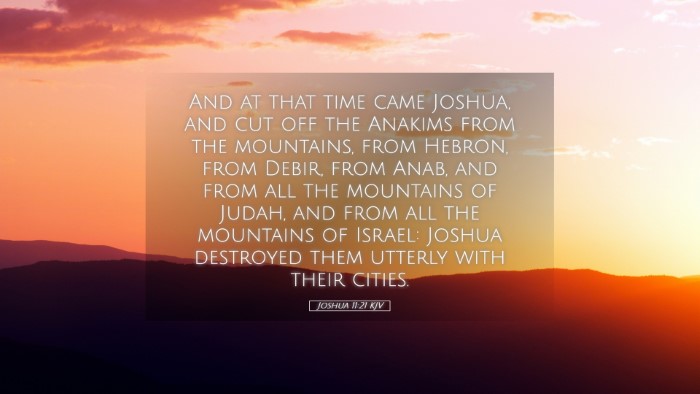Old Testament
Genesis Exodus Leviticus Numbers Deuteronomy Joshua Judges Ruth 1 Samuel 2 Samuel 1 Kings 2 Kings 1 Chronicles 2 Chronicles Ezra Nehemiah Esther Job Psalms Proverbs Ecclesiastes Song of Solomon Isaiah Jeremiah Lamentations Ezekiel Daniel Hosea Joel Amos Obadiah Jonah Micah Nahum Habakkuk Zephaniah Haggai Zechariah MalachiJoshua 11:21
Joshua 11:21 KJV
And at that time came Joshua, and cut off the Anakims from the mountains, from Hebron, from Debir, from Anab, and from all the mountains of Judah, and from all the mountains of Israel: Joshua destroyed them utterly with their cities.
Joshua 11:21 Bible Commentary
Commentary on Joshua 11:21
Verse: "And at that time came Joshua, and cut off the Anakims from the mountains, from Hebron, from Debir, from Anab, and from all the mountains of Judah, and from all the mountains of Israel: Joshua destroyed them utterly with their cities."
Introduction
The narrative within Joshua 11:21 is rich with historical and theological significance. It marks a decisive moment in Israel's conquest of Canaan, particularly in relation to the formidable giants known as the Anakim. This commentary will draw insights from public domain scholars, providing clarity on the text's implications for contemporary readers, especially pastors, students, and theologians.
Contextual Analysis
This verse falls in the larger context of Israel's conquest, where God fulfills His promise to give the land to His people. The Anakim, described as giants and fearful adversaries, symbolize the obstacles that stand between God's promises and His people. Their defeat showcases the power of God manifested through Joshua's leadership.
Historical Context
- Identity of the Anakim: The Anakim were reputed to be descendants of Anak, known for their stature and strength. They were seen as barriers to Israel's conquest, reflecting the larger theme of overcoming fear and doubt.
- The Mountains of Canaan: The geographical references to Hebron, Debir, Anab, and the mountains of Judah highlight the extensive reach of the conquest. These areas were strategic and symbolic, signifying not only physical land but also spiritual victory.
Theological Insights
According to Matthew Henry, this verse exemplifies God's faithfulness to Israel, demonstrating that no giants are too great for Him to overcome. It represents the urgency of complete obedience to God's commands, as Joshua acted with determination to carry out what was required of him.
God's Sovereignty and Power
- Divine Enablement: Joshua’s actions reflect a reliance on God’s power to overcome seemingly insurmountable foes. Albert Barnes emphasizes that the victories were not merely military triumphs, but displays of divine intervention flowing from Israel's covenant relationship with God.
- Complete Destruction: The verse notes the complete annihilation of the Anakim and their cities. Adam Clarke points out that this destruction serves as a divine mandate against idolatrous practices, indicating that nothing associated with the enemy's ways should remain.
Practical Applications
The lessons embedded within Joshua's conquests carry profound implications for believers today. Here are key takeaways for pastors, students, and theologians:
- Faith in Action: Believers are called to act on faith, confronting the "giants" in their lives with the assurance that God goes before them.
- Spiritual Warfare: Just as Joshua faced tangible enemies, modern Christians encounter spiritual adversaries. The story encourages vigilance and reliance on God’s strength in spiritual battles.
- Holiness and Separation: The obliteration of the Anakim and their cities implies a call to purity and separation from influences that lead one away from God. God’s command for total destruction signifies the importance of being distinct and holy.
Concluding Thoughts
The account in Joshua 11:21 is not merely a historical record but a timeless reminder of God’s sovereignty, power, and faithfulness. The challenges faced by Israel serve as a reflection of the spiritual journeys believers undertake today. By looking to Joshua's example and the underlying truths of this passage, individuals can find strength and encouragement in their own faith journeys.


